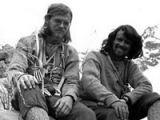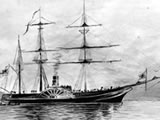What happened that day?
See historic events for any day of the year by entering the date below. Why not try your birthday?
Kiwi of the Week
Today in History

1970 Aoraki/Mt Cook route conquered by hippies
Long-haired Christchurch mountaineers John Glasgow and Peter Gough became the first to successfully scale the 2000-metre Caroline Face of Aoraki/Mt Cook, declaring it a ‘triumph for the hippies’.
The highest peak in New Zealand, at 3754 m, Aoraki/Mt Cook in the central Southern Alps became the focus of early mountaineering. Although not especially high by global standards, the New Zealand peaks are challenging climbs due to their unpredictable weather and heavy snowfall.
The first attempt on Aoraki/Mt Cook in 1882 was forced to turn back only 60 m from the summit. It was not until Christmas Day 1894 that Tom Fyfe, George Graham and Jack Clarke made it to the summit.
The Caroline Face of Aoraki/Mt Cook was the last unclimbed face of the mountain. Four climbers lost their lives in the 1960s while trying to scale it.
The efforts of men like Sir Edmund Hillary and Graham Dingle have helped give New Zealand an international reputation for mountaineering. Despite the ready access to mountains it was not until the closing decades of the 19th century that New Zealanders showed any interest in climbing for recreation. Early climbing was generally left to explorers and surveyors.
John Glasgow and Peter Gough (Te Ara)
Internal links

1848 The Acheron arrives to begin survey of NZ waters
Captained by John Lort Stokes, the paddle steamer Acheron spent four years charting the New Zealand coastline.
Image: the Acheron (Timeframes)




















